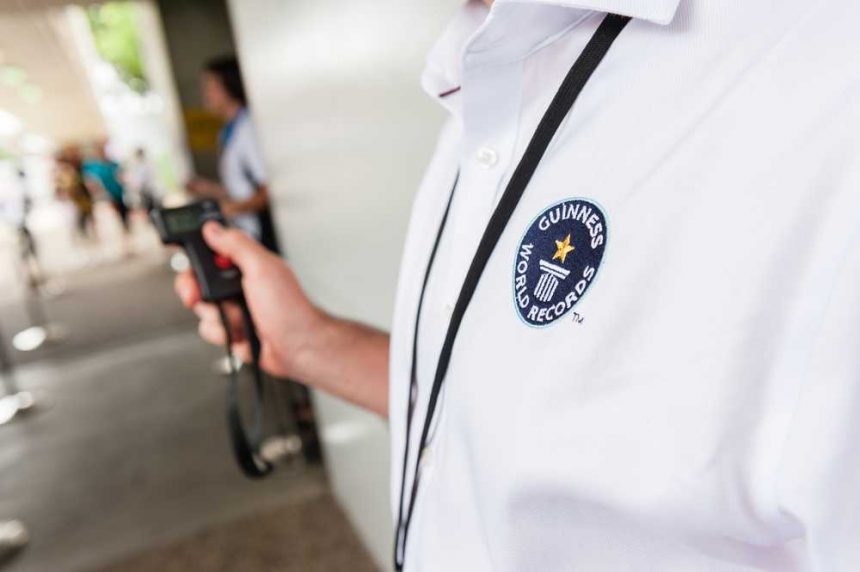<html><body><p>In the annals of human endurance, there are feats that defy comprehension and push the boundaries of what we believe to be possible. Among these extraordinary accomplishments stands the remarkable tale of a man who embarked on a sleepless odyssey, aiming to shatter records and delve into the depths of human resilience. Yet, the story that unfolds is not one of triumph alone but of the enduring consequences that linger long after the accolades fade. Meet the man who didn’t sleep for a record-breaking 264 hours, a feat that left him grappling with crippling effects for years to come. In this narrative of courage and consequence, we explore the harrowing journey of an individual who sought to conquer the limits of wakefulness, only to discover the profound toll it exacts on mind, body, and soul.</p><p><h2>The Record-Breaking Feat of Robert McDonald</h2><p>Imagine the sheer defiance of the body’s natural rhythm, the challenge against the very essence of human biology – staying awake for 453 hours and 40 minutes, close to 19 days, without succumbing to the lure of sleep. This extraordinary feat was achieved by Robert McDonald in 1986, a feat so perilous that Guinness World Records, the authority on human achievements, ceased monitoring such endeavors altogether. McDonald’s record, while a testament to human endurance, served as a stark warning of the inherent dangers of sleep deprivation.</p>
<p><h2>Unprecedented Endurance</h2><p>Robert McDonald’s achievement stands as a testament to the extraordinary endurance of the human body and spirit. To remain awake for such an extended period requires an unparalleled level of determination and resilience.</p>
<p><h2>Guinness World Records Ceases Monitoring</h2><p>The magnitude of McDonald’s accomplishment prompted Guinness World Records to cease monitoring records related to prolonged wakefulness. The decision underscores the recognition of the severe risks associated with extreme sleep deprivation.</p>
<p><h2>A Stark Warning</h2><p>McDonald’s record serves as a stark warning about the dangers of pushing the limits of sleep deprivation. The toll it takes on both physical and mental health is profound, highlighting the fragility of human well-being in the face of such challenges.</p>
<p><h2>Implications for Sleep Science</h2><p>While McDonald’s feat may seem extraordinary, it also offers valuable insights into the science of sleep. By pushing the boundaries of wakefulness, researchers can better understand the effects of sleep deprivation on the human body and mind.</p>
<p><h2>Ethical Considerations</h2><p>The cessation of monitoring such records raises ethical questions about the boundaries of human achievement. While feats of endurance are celebrated, they also raise concerns about the potential harm inflicted on participants.<p>
<p>McDonald’s record-breaking feat remains etched in the annals of human achievement, a remarkable demonstration of the limits of human endurance. Yet, it also serves as a cautionary tale, reminding us of the delicate balance between ambition and well-being. As we marvel at the extraordinary feats of individuals like Robert McDonald, let us also heed the warnings they offer about the dangers of pushing ourselves too far.</p><p><h2>A Cautionary Tale: The Hazards of Extreme Sleep Deprivation</h2><p>Since McDonald’s record-breaking feat, no one has dared to challenge it, a testament not only to the feat’s difficulty but also to the recognition of its peril. Guinness World Records, in a cautionary note on its website, explicitly urges individuals to refrain from attempting such challenges due to the severe risks associated with prolonged sleep deprivation.</p>
<p><h2>The Enduring Legacy of McDonald’s Feat</h2><p>Robert McDonald’s record remains unchallenged decades after its establishment, highlighting the enduring significance and difficulty of his achievement. The absence of contenders underscores the daunting nature of the task and the widespread acknowledgment of its inherent risks.</p>
<p><h2>Guinness World Records Warning</h2><p>The decision by Guinness World Records to discontinue monitoring records related to extreme sleep deprivation is a clear acknowledgment of the dangers involved. The organization’s explicit caution against attempting such challenges serves as a sobering reminder of the potential consequences of pushing the limits of wakefulness.</p>
<p><h2>Health Risks of Prolonged Sleep Deprivation</h2>&
lt;p>The severe risks associated with prolonged sleep deprivation are well-documented. Beyond the immediate effects of fatigue and cognitive impairment, extended wakefulness can lead to serious health complications, including cardiovascular issues, immune system dysfunction, and psychological disorders such as depression and anxiety.</p>
<p><h2>Impact on Physical and Mental Well-being</h2>&
lt;p>Sleep deprivation takes a profound toll on both physical and mental well-being. The body’s ability to regulate essential functions is compromised, while cognitive functions such as memory, decision-making, and emotional regulation are severely impaired. Prolonged wakefulness can also exacerbate existing mental health conditions and increase the risk of accidents and injuries.</p>
<p><h2>Ethical Considerations</h2>&
lt;p>The decision to cease monitoring records related to extreme sleep deprivation raises important ethical considerations. While the pursuit of human achievement is commendable, it must not come at the expense of participants’ health and safety. The potential for long-term harm and the ethical implications of encouraging individuals to push themselves to such extremes must be carefully weighed against the pursuit of records and accolades.</p>
<p>The cautionary tale of extreme sleep deprivation serves as a poignant reminder of the delicate balance between ambition and well-being. While feats of endurance may capture our imagination, they also compel us to consider the potential costs and consequences. As we reflect on McDonald’s record and its enduring legacy, let us prioritize the health and safety of individuals above the pursuit of fleeting glory.</p>
<p><h2>The Origins of Extreme Sleep Deprivation Challenges</h2>&
lt;p>The history of extreme sleep deprivation challenges traces back to 1963, when two teenage boys, Randy Gardner and Bruce McAllister, embarked on a perilous journey for their school science project. Inspired by the then-record held by a DJ in Honolulu who managed nearly 11 days without sleep, Gardner and McAllister sought to explore the effects of total sleep deprivation on the human brain.</p>
<p>Inspiration from a Record Holder: The seed of the idea was planted when Gardner and McAllister learned of the astonishing record set by a DJ in Honolulu, who defied sleep for nearly 11 days. Intrigued by the implications of such an extreme feat, the boys were motivated to delve deeper into the mysteries of sleep deprivation.</p>
<p>The Audacious Experiment: In a moment of youthful bravado, Gardner and McAllister decided to conduct their own experiment to push the boundaries of human wakefulness. Flipping a coin to determine the participant, fate designated Gardner as the primary subject of their audacious endeavor. McAllister, ever the supportive friend, willingly assumed the role of a vigilant observer, committed to documenting the effects of sleep deprivation on his companion.</p>
<p>The Commitment to Exploration: As the experiment unfolded, Gardner and McAllister found themselves immersed in an unprecedented exploration of the human mind’s resilience and vulnerability. Their commitment to pushing the boundaries of scientific inquiry underscored their passion for understanding the intricacies of sleep and its impact on cognitive function.</p>
<p>Unforeseen Challenges: Despite their initial enthusiasm, Gardner and McAllister encountered unforeseen challenges as the experiment progressed. The relentless march of sleeplessness took its toll not only on Gardner but also on McAllister, who found himself gradually succumbing to the same sleep deprivation he sought to observe.</p>
<p>The Consequences of Curiosity: The experiment, born out of curiosity and a desire for scientific exploration, carried profound consequences for both Gardner and McAllister. Their journey into the realm of extreme sleep deprivation would leave an indelible mark on their lives, serving as a cautionary tale about the perils of pushing the limits of human endurance.</p>
<p><h2>The Toll on Body and Mind: Gardner’s Experiment</h2><
p><p>Under the guidance of sleep researcher William Dement from Stanford University, Randy Gardner embarked on a journey that would test the limits of human endurance. Surpassing the existing record for prolonged wakefulness came at great personal cost, as Gardner’s physical and mental health bore the brunt of his unprecedented feat.</p>
<p><h2>Guided by Sleep Science</h2>&
lt;p>With the expertise of sleep researcher William Dement, Gardner ventured into uncharted territory, seeking to surpass the existing record for sleep deprivation. Dement’s guidance provided invaluable insights into the physiological and psychological effects of prolonged wakefulness, laying the groundwork for understanding the toll it would take on Gardner’s body and mind.</p>
<p><h2>Profound Physical Effects</h2>&
lt;p>Mental Strain and Cognitive Impairment</p>&
lt;p>As Gardner persisted in his wakefulness, his mental faculties deteriorated under the weight of sleep deprivation. Hallucinations, once a rarity, became a haunting reality as his mind struggled to distinguish between wakefulness and dreams. Paranoia gripped his thoughts, and his ability to concentrate waned, leaving him disoriented and detached from reality.</p>&
lt;p>Ethical Considerations
<p>The decision to cease monitoring records related to extreme sleep deprivation raises important ethical considerations. While the pursuit of human achievement is commendable, it must not come at the expense of participants’ health and safety. The potential for long-term harm and the ethical implications of encouraging individuals to push themselves to such extremes must be carefully weighed against the pursuit of records and accolades.</p>
<p>The cautionary tale of extreme sleep deprivation serves as a poignant reminder of the delicate balance between ambition and well-being. While feats of endurance may capture our imagination, they also compel us to consider the potential costs and consequences. As we reflect on McDonald’s record and its enduring legacy, let us prioritize the health and safety of individuals above the pursuit of fleeting glory.</p></body></html>






